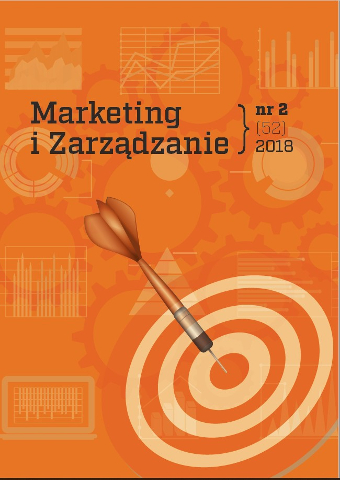
ISSN: 2450-775X
OAI
DOI: 10.18276/miz.2018.52-21


Issue archive /
nr 2 (52) 2018
Advergaming jako innowacyjna forma reklamowa
(Advergaming as an Innovative Advertising Form)
| Authors: |
Grzegorz
Szymański
Politechnika Łódzka, Wydział Zarządzania i Inżynierii Produkcji Barbara Mróz-Gorgoń Uniwersytet Ekonomiczny we Wrocławiu, Wydział Nauk Ekonomicznych Agata Stasiak |
| Keywords: | marketing innovations advergaming advertising games in-game-ads |
| Data publikacji całości: | 2018 |
| Page range: | 9 (225-233) |
| Klasyfikacja JEL: | M00 M31 M37 M39 |
Abstract
Advergames are an increasingly popular advertising tool in the modern advertising market. The main purpose of this study is to identify the acceptance level and analyze players' opinions in relation to advergaming. A questionnaire was carried out, which allowed to indicate significant trends in the subject, as well as to obtain answers to the questions asked. Analyzing the results obtained, it can be concluded that gaming ads are not fully accepted by players. Only 15.2% accept it, and for 24.3% they are indifferent. In the area of gender influence on opinions, it can be stated that gender is important in identifying the behaviour of players. In some areas the differences are great and there are no differences in others. Advergames is an effective marketing innovation that, thanks to the connection to the internet, allows ubiquitous and adequate access to the recipients.
Download file
Article file
Bibliography
| 1. | Calin, G. (2010). Advergames: characteristics, limitations and potential. Annals of Faculty of Economics, 1 (1), 726‒730. |
| 2. | Cauberghe, V., Pelsmacker de, P. (2010). Advergames: the impact of brand prominence and game repetition on brand responses. Journal of Advertising, 39 (1), 5‒18. |
| 3. | CNET (21.07.2018). Mobile gaming wins in the bedroom. Pobrano z: https://www.cnet.com/news/mobile-gaming-wins-in-the-bedroom/. |
| 4. | Dahl, S., Eagle, L. Fernandez, C. (2006). Analyzing advergames: active diversions or actually deception. W: K. Podnar, Z. Jancic, (red.), 11th International Corporate and Marketing Communications Conference. Ljubljana, Slovenia. |
| 5. | Domaradzki, K. (30.06.2015). 10 najlepszych outsourcingowych lokalizacji w Europie. Pobrano z: www.forbes.pl/najlepsze-outsourcingowe-lokalizacje-w-europie,artykuly,181556,1,1.html. |
| 6. | Dziewanowska, K. Kacprzak-Choińska, A. (2012). Marketing doświadczeń w Internecie na przykładzie gier reklamowych. Zeszyty Naukowe Uniwersytetu Szczecińskiego, 712, Problemy Zarządzania, Finansów i Marketingu, 26, 187‒198. |
| 7. | Ghirvu, A. (2012). In-game advertising: advantages and limitations for advertisers. The USV Annals of Economics and Public Administration, 12 (1), 114‒119. |
| 8. | Grabowska, J. (2012). Outsourcing usług logistycznych. Zeszyty Naukowe Politechniki Śląskiej. Organizacja i Zarządzanie, 60, 83‒96. |
| 9. | Gregor, B. Gotwald, B. (2012). Advergaming i grywalizacja jako trend i szansa dla marketingu. Zeszyty Naukowe Uniwersytetu Szczecińskiego, 712, Problemy Zarządzania, Finansów i Marketingu, 26, 199‒211. |
| 10. | GryOnline (27.07.2018). Najpopularniejsze gry na GRYOnline.pl w 2017 roku. Pobrano z: https://www.gry-online.pl/S013.asp?ID=107174. |
| 11. | Gupta, PB. Lord, KR. (2012). Product placement in movies: The effect of prominence and mode on audience recall. Journal of Current Issues and Research in Advertising, 20 (1), 47‒59. |
| 12. | IAB Polska (30.05.2018). Perspektywy rozwojowe reklamy online w Polsce. Pobrano z: https://iab.org.pl/wp-content/uploads/2017/12/Raport-Perspektywy-Rozwojowe-Reklamy-Online-2017-2018.pdf. |
| 13. | Karpińska-Krakowiak, M. (2016). Możliwości kształtowania zaangażowania konsumentów wobec marki w mediach społecznościowych za pomocą humoru. Studia i Prace WNEiZ US, 43 (2), 95‒103. |
| 14. | Mitręga, M. (2013). Advergaming jako rozwijająca się forma komunikacji marketingowej. Studia Ekonomiczne, 140, 133–143. |
| 15. | Mracek, P. Mucha, M. (2011). Application of knowledge in advergaming as a possible source of competitive advantage. Journal of Competitiveness, 11 (3), 108‒118. |
| 16. | Pomykalski, A. Blażlak, R. (2014). Współczesne tendencje zarządzania organizacjami poprzez innowacje. Studia Ekonomiczne, 183 (2), 141‒150. |
| 17. | Purswani, G. (2010). Advergames, their use and potential regulation. Asia Pacific Public Relations Journal, 11 (7), 57‒63. |
| 18. | Stobiecka, J., Stobiecki, P. (2015). Gamifikacja jako nowe narzędzie marketingu relacji – próba klasyfikacji odbiorców. Handel Wewnętrzny, 1 (354), 261‒271. |
| 19. | Szreder, M. (2004). Metody i techniki sondażowych badań opinii. Warszawa: PWE. |
| 20. | Tkaczyk, P. (2012). Grywalizacja. Jak zastosować mechanizmy gier w działaniach marketingowych. Gliwice: Helion. |